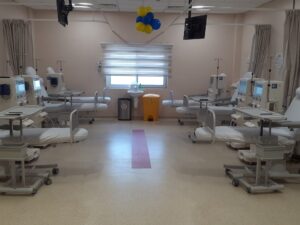The Bank Hospital, a private health institution located in Cantonment-Accra, has officially opened an Imaging and Renal Unit to provide dialysis treatment for patients suffering from kidney failure or kidney-related complications.
The new ultramodern edifice has 24 dialysis machines installed with both children and adult units. The ground floor of the three-storey building is dedicated to imaging – magnetic resonance imaging (MRI) and catheterization laboratory (Cathlab) while the first floor hosts the renal clinic -dialysis treatment rooms and consulting rooms. The second floor contains mammography care and dialysis private rooms. The third houses general offices and water treatment plants.
Chief Executive Officer, Bank Hospital, Indren Poovan, stated that the management of the bank is committed to delivering comprehensive health services to the public and is concerned about the inadequate dialysis treatment facilities in the country, hence the decision to invest in such a facility.
“In Ghana at the moment there is a huge shortage of dialysis stations and we felt in other to serve the country let’s open a renal center and make it an all-inclusive package so that it can be affordable to the average person to access treatment of dialysis,” he said.

The CEO further indicated that considering how expensive renal treatment is global, the Bank Hospital is offering an all-inclusive treatment at a breakdown fee of GH₵580 per session which includes dialysis, meals, and other treatments.
On her part, the Medical Director of the hospital, Dr. Charlotte Osafo, enumerated the various units of the operations, emphasizing that there are three nephrologists in charge of the facility, thus medical professionals who diagnose, treat, and manage acute and chronic kidney problems and diseases.
“We have procedure rooms, an acid concentrate room where we prepare our own acid for treatment, a waiting area for patients’ guests, wards, and an ambulance on standby to carry people to the main hospital in case of emergency.
We have a competent highly experienced renal team in place for this facility. Most dialysis units in the country only have nurses to manage the place and when they have problems then they call the doctor to come in and check or they carry the patient with an ambulance to another facility but we have three nephrologists on-site, two are permanent and one other from Korle-Bu Teaching Hospital to support. This is in addition to the experienced nurses available to support,” she said.
Dr. Anthony Nsiah-Asare, former Director-General of Ghana Health Service, and now Presidential Director on Health, in his remarks, commended the Bank Hospital management for such an investment indicated that government will engage with management for the facility to be used for medical education purposes such as training of more nephrologist, dialysis nurses and other laboratory assistance.
“I am hoping that the private sector will become a very strong player in health care because there is key investment potential in healthcare delivery but our private sector is not taking much advantage of it and we hope that going forward private sector will begin to look at such options,” he said.










